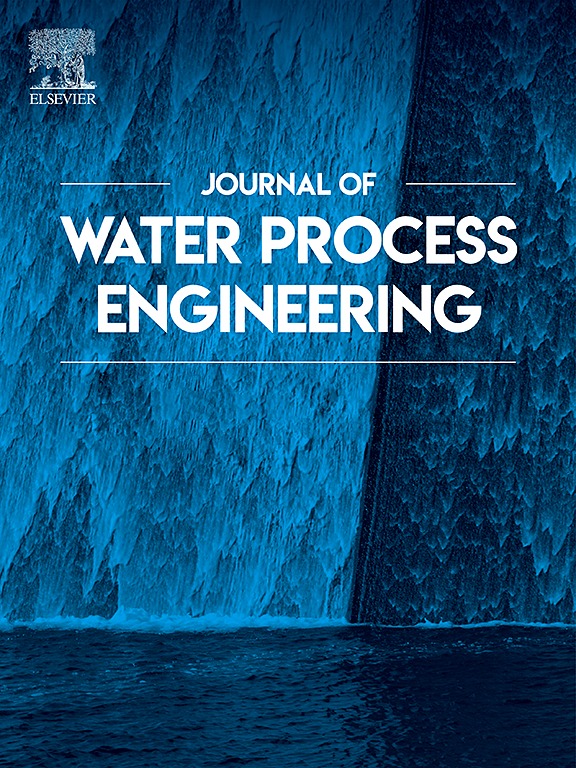中试碱-表面活性剂-聚合物驱采出水处理体系:性能及微生物群落分析
IF 6.7
2区 工程技术
Q1 ENGINEERING, CHEMICAL
引用次数: 0
摘要
本研究通过设计和实施中试规模的高级处理工艺,解决了处理碱性表面活性剂-聚合物(ASP)驱采出水的挑战。该处理系统包括一个自然沉淀池、一个生物反应器、一个溶气浮选(DAF)装置和多级滤池。该系统对三元复合驱采出水的处理能力为5 m3/h。该综合工艺有效地去除了采出水中的含油量、悬浮物和有机污染物。实验结果表明,该反应器对含油量的去除率为95.36%,对悬浮物的去除率为62.74%。大庆油田聚合物驱采出水经过三级过滤后,出水水质达到了严格的低渗透油藏回注标准。本研究综合分析了生物反应器内微生物群落组成和结构变化,确定了不同功能区的优势菌种,阐明了它们在污染物降解中的作用。与传统的物理化学工艺相比,该工艺的运营成本为1.15元/立方米,具有优越的经济可行性和环境可持续性。本研究提出的深度处理工艺为确保三元复合驱采出水水质稳定符合标准和发展要求提供了一种新的技术途径。本文章由计算机程序翻译,如有差异,请以英文原文为准。

Pilot-scale alkali-surfactant-polymer flooding produced water treatment system: performance and microbial community analysis
This study addressed the challenges of treating Alkaline-Surfactant-Polymer (ASP) flooding produced water by designing and implementing a pilot-scale advanced treatment process. The treatment train comprised a natural settling tank, a bioreactor, a dissolved air flotation (DAF) unit, and multi-stage filtration tanks. The system demonstrated a treatment capacity of 5 m3/h for ASP flooding produced water. The integrated process effectively removed oil content, suspended solids, and organic pollutants from the produced water. Experimental results revealed that the microbial reactor achieved removal rates of 95.36 % for oil content and 62.74 % for suspended solids. Subsequent three-stage filtration enhanced effluent quality to meet the stringent water reinjection standards for low-permeability reservoirs in Daqing Oilfield's polymer flooding produced water. This study comprehensively analyzed microbial community composition and structural changes within the bioreactor, identifying dominant bacterial species across different functional zones and elucidating their roles in pollutant degradation. With an operational cost of 1.15 CNY/m3, the proposed process demonstrates superior economic viability and environmental sustainability compared to conventional physicochemical processes. The advanced treatment process proposed in this study provides a novel technical approach to ensure stable compliance with standards and development requirements for ASP flooding produced water quality.
求助全文
通过发布文献求助,成功后即可免费获取论文全文。
去求助
来源期刊

Journal of water process engineering
Biochemistry, Genetics and Molecular Biology-Biotechnology
CiteScore
10.70
自引率
8.60%
发文量
846
审稿时长
24 days
期刊介绍:
The Journal of Water Process Engineering aims to publish refereed, high-quality research papers with significant novelty and impact in all areas of the engineering of water and wastewater processing . Papers on advanced and novel treatment processes and technologies are particularly welcome. The Journal considers papers in areas such as nanotechnology and biotechnology applications in water, novel oxidation and separation processes, membrane processes (except those for desalination) , catalytic processes for the removal of water contaminants, sustainable processes, water reuse and recycling, water use and wastewater minimization, integrated/hybrid technology, process modeling of water treatment and novel treatment processes. Submissions on the subject of adsorbents, including standard measurements of adsorption kinetics and equilibrium will only be considered if there is a genuine case for novelty and contribution, for example highly novel, sustainable adsorbents and their use: papers on activated carbon-type materials derived from natural matter, or surfactant-modified clays and related minerals, would not fulfil this criterion. The Journal particularly welcomes contributions involving environmentally, economically and socially sustainable technology for water treatment, including those which are energy-efficient, with minimal or no chemical consumption, and capable of water recycling and reuse that minimizes the direct disposal of wastewater to the aquatic environment. Papers that describe novel ideas for solving issues related to water quality and availability are also welcome, as are those that show the transfer of techniques from other disciplines. The Journal will consider papers dealing with processes for various water matrices including drinking water (except desalination), domestic, urban and industrial wastewaters, in addition to their residues. It is expected that the journal will be of particular relevance to chemical and process engineers working in the field. The Journal welcomes Full Text papers, Short Communications, State-of-the-Art Reviews and Letters to Editors and Case Studies
 求助内容:
求助内容: 应助结果提醒方式:
应助结果提醒方式:


